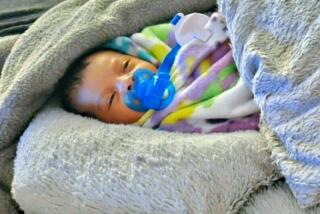Finally, a Better Way to Check Out Your Baby-Sitter’s Past
- Share via
Are you absolutely certain that the person caring for your child has no criminal past?
If your sitter works in a facility that is licensed by the state--a day-care center, for example--this information has, in theory, already been ascertained for you. But plenty of children are cared for by perfectly legal unlicensed sitters: the person who comes to your home every day, for instance, or the “trained” nanny who comes from an agency. Summer camp counselors don’t have to be licensed. Nor do recreation program workers.
Most parents rely on interviews, reference checks and word-of-mouth from friends. That’s what Mary Beth Phillips did. To her lasting regret.
After her 6-month-old daughter, Elizabeth, was blinded by Colette Andrews, a nanny who almost shook the infant to death, and after a judge convicted Andrews of felony child abuse but refused to put her in jail and allowed her to keep working with children, Phillips resolved to find a way to protect children from people such as Andrews.
“There may be no way to stop first-time abuse,” says Phillips, whose daughter is now 10, “but there is no reason to replicate the trauma for another family. I kept thinking of all the families that would hire Colette Andrews, who tried to murder my kid.”
Seven years ago, Phillips joined forces with Bonnie Reeves, another mother whose child had suffered shaken infant syndrome at the hands of an abusive care-giver. The two had met, in fact, when their children were first hospitalized. They decided there had to be a way for parents to protect their children from baby-sitters with histories of child abuse.
They came up with a public program called Trustline.
*
Their idea is so unrevolutionary that you will probably shake your head in amazement that it doesn’t already exist.
Trustline is a state registry, a way for parents to check the backgrounds of unlicensed care-givers. Names and fingerprints of child-care workers who agree to be checked will be compared against the state’s criminal history system and child abuse index. An applicant with a record will not be accepted in the registry.
A pilot program in five California counties between 1989 and 1991 found that 5% of 1,351 would-be care-givers had backgrounds of the sort that would automatically make them unlicenseable as providers of child care. (Anything other than minor traffic violations are investigated by the California Department of Justice.)
The bill authorizing Trustline has been approved by the California Assembly, 71-4, and is slated for a Senate vote in late August. If the Senate passes the bill and the governor signs it, the registry goes into effect on Jan. 1, 1994.
Searches, which will be administered through the state’s child care resource and referral agencies, will cost $80. Care-givers with unblemished records will be registered permanently on Trustline; others have the right to appeal.
No one knows how many people who are asked to provide fingerprints will decide against applying for child care work. But common sense says Trustline will function as a deterrent.
“Elizabeth’s abuser never would have submitted to fingerprinting,” said Phillips, a therapist who lives in Moraga. “She didn’t want anyone to know who she was.” Indeed, Colette Andrews turned out to be a man undergoing a sex change. The judge refused to put her in jail because of that, although he later amended his ruling and said he would have to approve any contact she had with children. Andrews’ sentence: a $100 fine, five years of probation and 2,000 hours of community service.
Phillips says she knows one woman who, during the pilot program, was on the verge of hiring a sitter for her disabled son when, at the end of a very positive interview, she hesitatingly mentioned Trustline. “I think you are great,” the mother said, “but this checks your history.”
Oh , said the sitter, maybe I should tell you about how they took my three children away for neglect .
*
Eighty dollars seems like nothing when Mary Beth Phillips starts toting up the price her family has paid for Colette Andrews’ unspeakable act.
The family’s insurance company has paid $400,000 in medical bills. There were several years of legal procedures. Physical therapy. Psychotherapy. Medicine. Braille writers. And of course, the greatest price of all, Elizabeth’s sight.
Phillips, you should know, was very careful choosing a sitter for her baby girl. Colette Andrews was a neighbor’s nanny. The neighbor also happened to be a colleague of Phillips’ husband. Phillips only needed part-time child care for two weeks, while she completed some graduate courses in psychology. The neighbor offered to share Andrews.
“You can picture a graduate student in psychology intensely into her new baby,” says Phillips. “I was fairly obsessive. I spent a whole morning with this lady talking about Elizabeth. I thought to myself, ‘Well, I certainly would not hire this person full time.’ This was not a warm individual. But she seemed fine for the short term.”
Andrews never admitted the crime. To the end, she blamed her employer’s 16-pound terrier for shaking Elizabeth. Phillips says her family is lucky because the prosecutor decided to have the dog examined. A court-appointed veterinarian testified that the dog had a heart murmur, and such strenuous shaking would have killed it.
People like Colette Andrews may not be stopped from abusing a child once. But after Trustline is established, they might well be stopped from doing it again.
And $80 would be a small price to pay.



